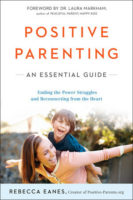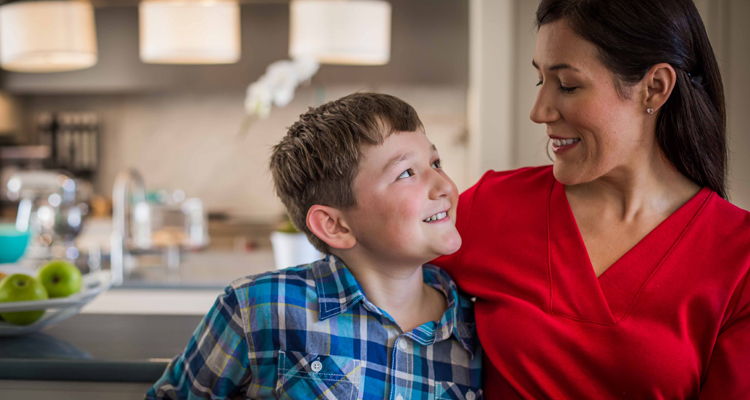 Parents want the best for their children. Oftentimes, the endless schedules and challenging nature of raising a child can be overwhelming. Rebecca Eanes is the author of Positive Parenting: An Essential Guide. Eanes’ new book provides helpful advice for a calmer more child-centered method for raising a family. Positive Parenting is centered on building a real relationship with your children and building a childhood for them that’s memorable for the right reasons.
Parents want the best for their children. Oftentimes, the endless schedules and challenging nature of raising a child can be overwhelming. Rebecca Eanes is the author of Positive Parenting: An Essential Guide. Eanes’ new book provides helpful advice for a calmer more child-centered method for raising a family. Positive Parenting is centered on building a real relationship with your children and building a childhood for them that’s memorable for the right reasons.
“I think the most important way we gain respect is by treating them with respect. Some discipline methods are quite disrespectful, and they not only erode our connection but they cause children to lose their respect for the adults who inflict it upon them,” says Eanes. “So, getting rid of physical discipline and shaming methods would be a good first step. I think we gain respect by being a calm, self-controlled, consistent leader, and by consistent, I mean that children know what to expect from us. We don’t get so rocked by their behavior that we lose our cool easily and we, likewise, do not easily compromise our boundaries.”
Eanes also recommends that parents strive to live with integrity. “If you punish kids for yelling at you but then turn right around and yell at them, they will not miss the inconsistency in your message. The ‘do as I say, not as I do’ approach doesn’t earn respect. We must embody our values and give them an example to live up to,” says Eanes.
Discipline is another controversial element that many parents struggle with. Instead of responding to your child’s behavior with a reactive approach, it’s important to evoke a positive and proactive discipline methodology. Parents are proactive in their disciplinary structure because they’re constantly encouraging positive behavior rather than just reacting to negative actions. “One benefit is that children actually learn what to do to improve behavior rather than simply learning what is unacceptable. Where conventional discipline such as time-outs and spanking fall short is that that they only punish poor behavior but do not give children the necessary skills or appropriate alternative actions,” says Eanes. Positive discipline focuses on what a child must improve on rather than what they need to stop doing. In addition, the consistent positive reinforcement will help to develop a quality relationship and connection that will be preserved and maintained.
Another important way to develop strong bonds and structure is through routines and rituals. Eanes believes that children thrive with consistent and predictable routines because they provide a sense of safety and stability. When unorganized people envision routines sometimes they are clouded with the idea that the schedule must be rigid and binding, however, that’s not the idea. Routines and rituals provide a child with a flow that will help a child understand that importance of family and how they belong. “Consistent routines help establish good habits early on, such as personal and sleep hygiene. Routines also tend to make the day run more smoothly because the children already know what to expect,” says Eanes. “The rituals such as songs, stories, and repeated phrases provide little connection points through the day that speak love and belonging.”
Other basic parenting tips that Eanes suggests include:
1) Set aside distractions and focus on family time each day. Incorporating a short amount of time into each day where parents can give their children their undivided attention goes a long way in nurturing a connection.
2) Know what makes your child feel loved and do it often. I think we sometimes assume that our children know we love them because we give them toys and gadgets or run them here and there. Yet, it’s really those heart-to-heart moments when children feel seen, accepted, and understood that speaks love the loudest.
3) Visit their worlds. It’s too easy to run between the tasks on our adult agendas without slowing down enough to truly engage with our children in their worlds. For young children, this means getting down on the floor and playing trains or dressing up in a costume and playing a part in their pretend story. For older children, it could be playing a video game together or going to see a movie of their choice. The keys when visiting their world is engaging and listening while you’re there.
4) Create loving rituals. Many parents have a loving bedtime routine complete with books and kisses, but there are many opportunities throughout the day to create these loving rituals, which are like little connection points. It can be as easy as a special morning greeting or love notes in the lunchbox. These are just a few seconds to a few minutes of time throughout the day that shows your joy at being in their presence.
5) Be trustworthy. Without trust, there can be no healthy connection. There are so many ways to build trust from infancy to adulthood. Here are just a few.
- Respond tenderly and promptly to cries and upsets
- Keep your promises
- Live the messages you speak
- Be a good listener
- Avoid embarrassing your child in public or in front of peers
- Don’t speak ill of them to others, especially if they are in earshot
- Respect their privacy
Moreover, parents must be willing to be intentional, which entails making conscious choices that coincide with their own beliefs and goals. Being intentional may appear to be common sense, however, the constant day to day can oftentimes cloud judgment or cause confusion. Parents must stop from time to time and look at the world from their child’s perspective. “It’s fine to seek new information or learn different parenting skills for sure, but I think it’s good to get out of our own shoes sometimes and look at life from our kid’s perspective,” says Eanes. Being able to see things from a child’s view provides parents with the opportunity to meet their child with compassion and gentleness, which often gets lost within the challenges of parenting.

































































































